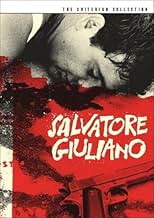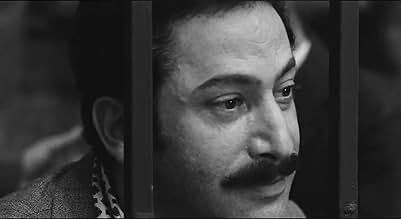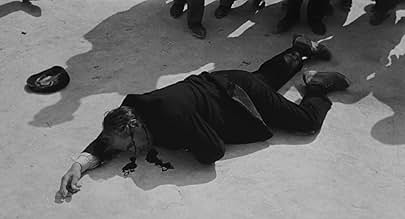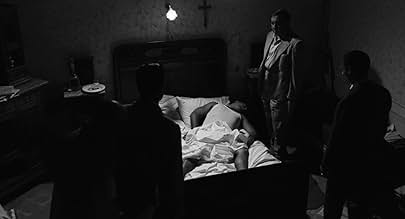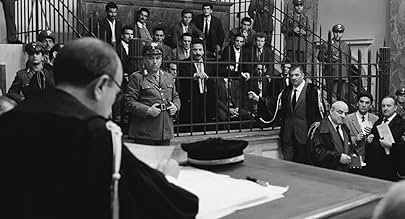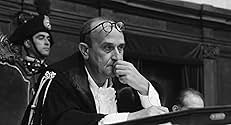VALUTAZIONE IMDb
7,3/10
4303
LA TUA VALUTAZIONE
Le complicazioni tra i poteri del governatore, il partito di indipendenza e la mafia nella Sicilia degli anni '40 culminano con la morte di Salvatore Giuliano.Le complicazioni tra i poteri del governatore, il partito di indipendenza e la mafia nella Sicilia degli anni '40 culminano con la morte di Salvatore Giuliano.Le complicazioni tra i poteri del governatore, il partito di indipendenza e la mafia nella Sicilia degli anni '40 culminano con la morte di Salvatore Giuliano.
- Premi
- 6 vittorie e 4 candidature totali
Frederico Zardi
- Pisciotta's Defense Counsel
- (non citato nei titoli originali)
Pippo Agusta
- Minor Role
- (non citato nei titoli originali)
Sennuccio Benelli
- Reporter
- (non citato nei titoli originali)
Giuseppe Calandra
- Minor Official
- (non citato nei titoli originali)
Pietro Cammarata
- Salvatore Giuliano
- (non citato nei titoli originali)
Max Cartier
- Francesco
- (non citato nei titoli originali)
Nando Cicero
- Bandit
- (non citato nei titoli originali)
Pietro Franzone
- Seperatist
- (non citato nei titoli originali)
Giovanni Gallina
- Bit Part
- (non citato nei titoli originali)
Vincenzo Norvese
- Bit Part
- (non citato nei titoli originali)
Carmelo Oliviero
- Don Nitto Minasola
- (non citato nei titoli originali)
Renato Pinciroli
- Pinciroli
- (non citato nei titoli originali)
Francesco Rosi
- Narrator
- (voce)
- (non citato nei titoli originali)
Giuseppe Teti
- Priest of Montelepre
- (non citato nei titoli originali)
Cosimo Torino
- Frank Mannino
- (non citato nei titoli originali)
Trama
Lo sapevi?
- QuizMartin Scorsese credits this film as being one of his many inspirational sources for the look and style of his Taxi Driver (1976).
- BlooperWhen his mother comes to view and identify his corpse, Salvatore's stomach clearly moves as the actor struggles to control his breathing.
- ConnessioniEdited into Il sasso in bocca (1970)
Recensione in evidenza
Filmed in the actual Siciilian locations, this film is a fair attempt to strip away the myth surrounding bandit-cum-revolutionary Giuliano. In fact, he doesn't appear except as a gunned-down corpse at the beginning. The film winds back to unravel the events leading to his death, and forwards to its consequence. This is a clever method of achieving objectivity while at the same time subtly emphasising the man's elusive and mysterious qualities. To show Giuliano would have either been either hagiography or iconoclasm. The film rose above that and broadened its inquiry into the wider social and political context, effectively belittling him as the puppet of various forces jostling for position in Sicily after the war: bandits, police, local aristocracy, the Italian government, communists, and the Mafia.
This sets quite a challenge for itself, partly because of the vacuum at its centre, partly because of the obscurity and complexity of the real events. We are delivered to a chaotic courtroom to try to piece it together. The film finally latches onto Giuliano's lieutenant the only one who seems to know something of what is going on - but even he is silenced. It's all the more disturbing for the confusion.
Rosi is one of the best directors of crowds scenes and he gives raucous energy to any gathering of men, especially in the courtroom. He induces a kind of group hysteria in his actors; they are totally unaware of the camera and the result is an almost disturbing hyper-real feel (real crowds are dull in comparison) it's really something to appreciate. To get into this film, you need to invest something in the passions of the various parties involved - if not sympathise with them, then at least understand them. Without this, the danger is that it all boils down to so much petty bickering. The same might be said of the Godfather, which clearly owes a huge debt to Rosi's style.
Influential then, somewhat brave, with some fine directorial moments, and an interesting history lesson. Hard to actually like, but hard not to admire.
This sets quite a challenge for itself, partly because of the vacuum at its centre, partly because of the obscurity and complexity of the real events. We are delivered to a chaotic courtroom to try to piece it together. The film finally latches onto Giuliano's lieutenant the only one who seems to know something of what is going on - but even he is silenced. It's all the more disturbing for the confusion.
Rosi is one of the best directors of crowds scenes and he gives raucous energy to any gathering of men, especially in the courtroom. He induces a kind of group hysteria in his actors; they are totally unaware of the camera and the result is an almost disturbing hyper-real feel (real crowds are dull in comparison) it's really something to appreciate. To get into this film, you need to invest something in the passions of the various parties involved - if not sympathise with them, then at least understand them. Without this, the danger is that it all boils down to so much petty bickering. The same might be said of the Godfather, which clearly owes a huge debt to Rosi's style.
Influential then, somewhat brave, with some fine directorial moments, and an interesting history lesson. Hard to actually like, but hard not to admire.
- federovsky
- 20 dic 2008
- Permalink
I più visti
Accedi per valutare e creare un elenco di titoli salvati per ottenere consigli personalizzati
- How long is Salvatore Giuliano?Powered by Alexa
Dettagli
- Data di uscita
- Paese di origine
- Lingua
- Celebre anche come
- Sicilia 1943-60
- Luoghi delle riprese
- 98 Via Serafino Mannone, Castelvetrano, Trapani, Sicily, Italia(Giuliano's body)
- Aziende produttrici
- Vedi altri crediti dell’azienda su IMDbPro
- Tempo di esecuzione2 ore 3 minuti
- Colore
- Mix di suoni
- Proporzioni
- 1.85 : 1
Contribuisci a questa pagina
Suggerisci una modifica o aggiungi i contenuti mancanti

Divario superiore
By what name was Salvatore Giuliano (1962) officially released in Canada in English?
Rispondi
